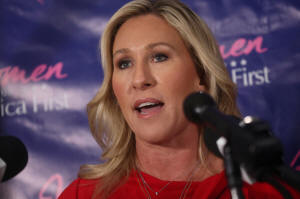U.S. Republican Marjorie Taylor Greene not sure whether she advocates
violence
 Send a link to a friend
Send a link to a friend
 [April 23, 2022]
By Jan Wolfe [April 23, 2022]
By Jan Wolfe
(Reuters) -Republican U.S. Representative
Marjorie Taylor Greene on Friday told a lawyer for voters seeking to
disqualify her from running for re-election that she did not know how to
answer a question about whether she advocates violence against people
with whom she disagrees.
Greene testified in a Georgia state court in Atlanta in a novel legal
challenge to her candidacy accusing her of violating a U.S. Constitution
provision called the "Insurrectionist Disqualification Clause" by
supporting an incendiary rally that preceded last year's attack on the
U.S. Capitol.
Andrew Celli, a lawyer for the voters, asked Greene during the hearing
before administrative law judge Charles Beaudrot whether she has
advocates political violence against people with whom she disagrees.
"I don't think so," Greene replied. "I don't know how to answer that."
Greene is a prominent supporter of former President Donald Trump. In
comments to the media, she has downplayed and justified the Jan. 6,
2021, Capitol assault by Trump supporters in their failed bid to block
congressional certification of President Joe Biden's 2020 election
victory.
Trump at the preceding rally told his supporters to march to the Capitol
and "fight like hell," repeating his false claims that the election was
stolen through widespread voter fraud. The Trump supporters attacked
police, ransacked parts of the Capitol and send lawmakers into hiding
for their own safety.

"I was asking people to come for a peaceful march, which everyone is
entitled to do," Greene told the hearing. "I was not asking them to
actively engage in violence."
The constitutional clause, added after the U.S. Civil War of the 1860s,
prohibits politicians from running for Congress if they have engaged in
"insurrection or rebellion" or "given aid or comfort" to the nation's
enemies.
Greene, who represents a Georgia district in the U.S. House of
Representatives, is seeking re-election this year, with the Republican
primary scheduled on May 24 and the general election on Nov. 8.
Celli also questioned Greene about a video she recorded in 2019, before
she took office, calling U.S. House of Representatives Speaker Nancy
Pelosi a "traitor." Greene at first denied making the statement, but
then admitted to it under questioning by the Celli and the judge.
[to top of second column]
|

U.S. Rep. Marjorie Taylor Greene (R-GA) delivers an "America First
response" to the U.S. President Joe Biden?s State of the Union
speech from a hotel room in Washington, U.S., March 1, 2022.
REUTERS/Leah Millis/File Photo
 Greene's lawyer argued that the
statement was "hyperbole" and irrelevant to the case.
The voter challenge is being spearheaded by a group called Free
Speech for People that advocates for campaign finance reform. A
similar challenge backed by the same group against Republican U.S.
Representative Madison Cawthorn failed when a federal judge in North
Carolina dismissed that suit on March 4.
Ron Fein, a lawyer for the voters seeking Greene's disqualification,
said in his opening remarks that the congresswoman played an
"important role" in instigating the attack on the U.S. Capitol.
"In some cases, the mask falls and she shows us exactly what she
intended," Fein said.
Greene's lawyer, James Bopp, argued during his opening remarks that
removing her from the ballot would be both unfair to her and to
voters in her conservative-leaning district. Greene is expected to
appeal any ruling against her, and has already brought parallel
litigation in U.S. federal court seeking to halt the administrative
proceeding.
In a recent court filing, Greene's lawyers said she "vigorously
denies that she aided and engaged in insurrection to obstruct the
peaceful transfer of presidential power."
"Fundamentally, First Amendment rights are at stake, not only the
right to vote, as I've mentioned, or the right to run for office,"
Bopp said during the hearing, referring to the Constitution's free
speech protections.
Absentee ballots will start to be mailed on April 25.
(Reporting by Jan Wolfe; Editing by Will Dunham, Scott Malone and
Daniel Wallis)
[© 2022 Thomson Reuters. All rights
reserved.] This
material may not be published, broadcast, rewritten or
redistributed.
Thompson Reuters is solely responsible for this content.
 |